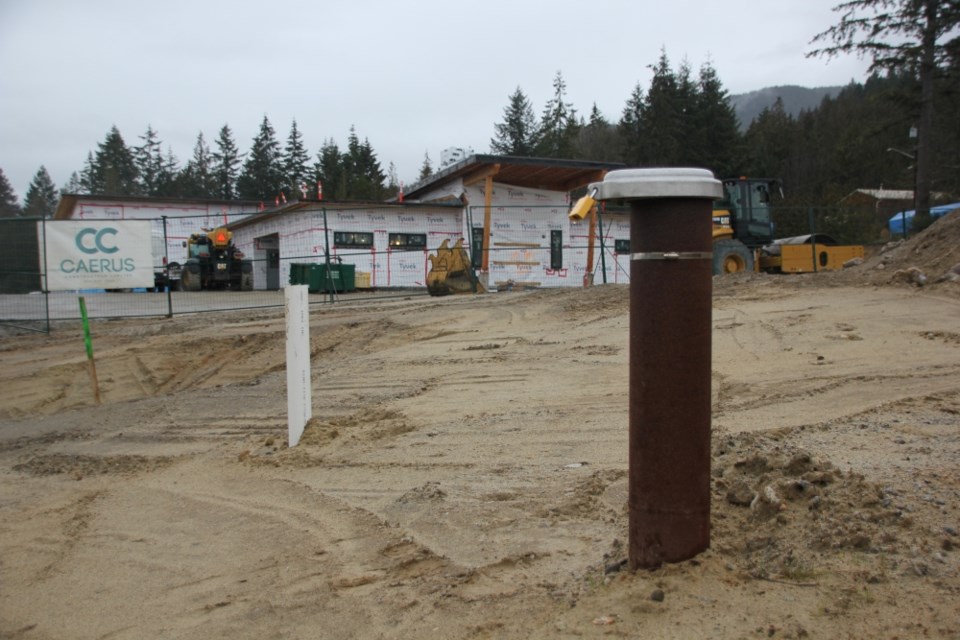As Sechelt council received an update on the project to test nonpotable water use at Dusty Road, elected officials shared a concern they’d heard from the public: Could the district ‘flip a switch’ to potable water use?
The District of Sechelt first announced plans to test Dusty Road for nonpotable water use in a press release on April 14. At an April 26 committee of the whole meeting, staff provided a brief update on the project.
Kirn Dhillon, the director of engineering and operations, clarified the difference between the approval processes for potable and nonpotable water.
Drinking water requires approval from Vancouver Coastal Health and is a “much more rigorous process,” because multiple permits are required. Approval and acceptance into the Sunshine Coast Regional District’s water system would also be necessary for drinking water. For nonpotable water, only a provincial use permit is required. Another distinction is supplying water to a municipality requires a longer process than drilling a well on private property.
“I think that the public can be rest assured that there's checks and balances throughout the system,” Dhillon said.
Dhillon said the project’s intention is for nonpotable use similar to what is provided from the Ebbtide well at the water resource centre, and would be used at the operations centre now located on Dusty Road. The water would also be available to the public for nonpotable uses. The staff report also includes a tentative timeline: phase one April and May, followed by phase two in June and July, and phase three concluding in August of this year. This timeline assumes the provincial approval would be in May, but notes the processing time for groundwater use licences is three to five years.
A licence application has been submitted to the province, as Sechelt staff work on conceptual planning and engage with suppliers and consultants to determine the project’s scope. Once quotes and provincial feedback are received, staff will present a revised budget proposal to council for approval.
Earlier in the meeting, Coun. Dianne McLauchlan said her impression was that council approved water testing, not this next step. “So I'm a little surprised by this because I think we should take it slowly and cautiously,” McLauchlan said.
Dhillon responded that safety is the utmost concern to staff.
The manager of sustainable infrastructure, Meghan Lee, said a significant amount of testing on a Dusty Road test well was done in late 2018. In terms of aquifer hydrology, she said, that’s not long ago. In Lee’s conversations with the province since submitting the application for a groundwater licence, she said the province considers it a sufficient amount of testing at this time. Once the province is reviewing the permits, it will request any necessary information.
Dhillon added that the province would want the most recent water quality testing right before a well is ready to open. Another safeguard would be observation wells for backup water quality testing and to triangulate groundwater flow.
“But testing now not knowing when the province is going to be reviewing that data may not be the best use of that money at this time until we have a better sense of the timelines and how close they are to reviewing that data,” Lee said.
Mayor John Henderson expressed a sense of urgency. “The intent, at least, of the work or the discussion we had a couple of weeks ago was to get going now. We need water. We need all sources of water for what appears to be a very dry season coming.”
After some discussion about contacting experts, Dhillon shed some light on the staff process, saying small items such as requesting quotes for pump testing can be sent via email. He recently drafted an expression of interest to various vendors and suppliers for a range of costs and timeframes. Staff are doing that kind of background work now to come back to council with a plan. The uncertainty, he said, lies in the time it’s going to take to receive a permit “because we’re not going to turn on the taps without a permit.”
The report was presented to council for information, and no decision was required at the time of the meeting. The next council meeting is scheduled for May 3.


